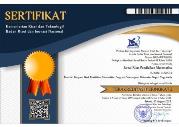Penerapan model pembelajaran NHT-TGT untuk meningkatkan motivasi dan pemahaman konsep materi matematika SMA
Abstract
Penelitian ini bertujuan untuk mendeskripsikan penerapan NHT-TGT dalam meningkatkan motivasi dan pemahaman konsep materi matematika SMA dari mahasiswa Kelas 2C Program Studi Pendidikan Matematika Universitas Islam Malang. Penelitian ini dilatarbelakangi oleh hasil studi pendahuluan yang kurang memuaskan. Skor motivasi mahasiswa tergolong dalam kriteria “sangat rendah” dengan skor 48,4. Hasil tes pemahaman konsep mahasiswa juga masih kurang memuaskan, hanya 22,6% mahasiswa “tuntas”, yaitu mahasiswa yang mendapatkan nilai Penelitian ini merupakan penelitian tindakan kelas yang dilaksanakan dalam 2 siklus dimana masing-masing siklus terdiri atas 4 pertemuan. Hasil dari siklus pertama menunjukkan persentase mahasiswa yang tuntas dalam pemahaman konsep mahasiswa meningkat menjadi 48,3%. Pada akhir siklus I, motivasi mahasiswa juga meningkat ke kategori “rendah” dengan skor 66. Selanjutnya, di siklus II motivasi kembali meningkat dan masuk kategori “tinggi” dengan skor 84,8. Demikian juga dengan persentase mahasiswa yang tuntas dalam pemahaman konsep meningkat menjadi 90,3%. Jadi penerapan NHT-TGT terbukti dapat meningkatkan pemahaman konsep dan motivasi mahasiswa.
Kata Kunci: Number Head Together (NHT), Team Games Tournament (TGT), motivasi, pemahaman konsep, materi matematika SMA
Implementation of NHT-TGT Learning Model to Improve Motivation and Conceptual Understanding of Mathematics for Senior High School
Abstract
The study aims to describe the application of NHT-TGT to improve students of Class 2C Mathematics Education Program University of Islam Malang’s motivation and understanding of high school mathematics material concept. The study is motivated by the results of preliminary studies were less than satisfactory. Student motivation score belonging to the criteria of "very low" with a score of 48.4. Student conceptual understanding test results are still unsatisfactory, only 22.6% of the students "completes", that is student scores ≥60. The study is a classroom action research which performed in 2 cycles with each cycle consisting of 4 meetings. The results of the first cycle show the percentage of students who complete the understanding of the concept increased to 48.3%. At the end of the first cycle, the students’ motivation also increased to the category of "low" with a score of 66. Furthermore, in the second cycle motivation score increased and categorized of "high" with a score of 84.8. Likewise, the percentage of students who complete the understanding of the concept increased to 90.3%. So the application of NHT-TGT is proven to improve student understanding of concepts and motivation.
Keywords: Number Head Together (NHT), Team Games Tournament (TGT), motivation, concept understanding
Keywords
Full Text:
FULLTEXT PDFReferences
Amiluddin, R., & Sugiman, S. (2016). Pengaruh problem posing dan PBL terhadap prestasi belajar, dan motivasi belajar mahasiswa pendidikan matematika. Jurnal Riset Pendidikan Matematika, 3(1), 100–108. http://doi.org/10.21831/jrpm.v3i1.7303
Arikunto, S. (2010). Prosedur penelitian: Suatu pendekatan praktik. Jakarta: Rineka Cipta.
Aspriyani, R., Mardiyana, M., & Saputro, D. R. S. (2014). Eksperimentasi pembelajaran matematika dengan model kooperatif tipe NHT dan TPS terhadap prestasi belajar dan motivasi berprestasi siswa ditinjau dari kecerdasan emosional pokok materi persamaan linear satu variabel pada siswa SMP negeri di Kota Surakarta. Jurnal Pembelajaran Matematika, 2(6), 643–654. Retrieved from https://jurnal.uns.ac.id/jpm/article/view/10468
Farhan, M., & Retnawati, H. (2014). Keefektifan PBL dan IBL ditinjau dari prestasi belajar, kemampuan representasi matematis, dan motivasi belajar. Jurnal Riset Pendidikan Matematika, 1(2), 227. http://doi.org/10.21831/jrpm.v1i2.2678
Handayani KD, F. (2010). Pembelajaran kooperatif tipe team game tournament (TGT) untuk meningkatkan hasil belajar siswa kelas VII SMP Negeri 1 Purwodadi Kabupaten Pasuruan pada materi keragaman bentuk muka bumi / Fitri Handayani KD. Program Studi Pendidikan Geografi, Universitas Negeri Malang. Retrieved from http://library.um.ac.id/ptk/index.php?mod=detail&id=38440
Hunter, W. C., Maheady, L., Jasper, A. D., Williamson, R. L., Murley, R. C., & Stratton, E. (2015). Numbered heads together as a tier 1 instructional strategy in multitiered systems of support. Education and Treatment of Children, 38(3), 345–362.
Idris, N. (2009). Enhancing students’ understanding in calculus trough writing. International Electronic Journal of Mathematics Education, 4(1), 36–55. Retrieved from http://www.iejme.com/makale/323
Lince, R. (2016). Creative thinking ability to increase student mathematical of junior high school by applying models numbered heads together. Journal of Education and Practice, 7(6), 206–212.
Meece, J. L., Anderman, E. M., & Anderman, L. H. (2006). Classroom goal structure, student motivation, and academic achievement. Annu. Rev. Psychol, 57, 487–503. http://doi.org/10.1146/annurev.psych.56.091103.070258
Meletiou-Mavrotheris, M., & Mavrotheris, E. (2012). Game-enhanced mathematics learning for pre-service primary school teachers. In ICICTE Proceedings (pp. 455–465). Cyprus. Retrieved from http://www.icicte.org/Proceedings2012/Papers/12-1-Meletiou.pdf
Park, H. (2012). Relationship between motivation and student’s activity on educational game. International Journal of Grid and Distributed Computing, 5(1). Retrieved from http://www.sersc.org/journals/IJGDC/vol5_no1/8.pdf
Ratnaningsih, D. (2011). Penerapan realistic mathematics education (RME) untuk meningkatkan motivasi belajar matematika siswa SMK Negeri 4 Malang. Thesis. Universitas Negeri Malang. Retrieved from http://karya-ilmiah.um.ac.id/index.php/disertasi/article/view/11454
Ristanti, Y. (2016). Peningkatan motivasi dan keterampilan hitung pecahan desimal melalui media manipulatif pada pembelajaran tematik-integratif SD. Riset Pendidikan Matematika, 3(1), 122–136.
Slavin, R. E. (2014). Educational psychology: Theory and practice. Pearson College Div.
Sugiyono. (2010). Metode penelitian kuantitatif kualitatif dan R & D. Bandung: Alfabeta.
Tella, A. (2007). The impact of motivation on student’s academic achievement and learning outcomes in mathematics among secondary school students in Nigeria. EURASIA Journal of Mathematics, Science and Technology Education, 3(2), 149–156. Retrieved from http://www.iserjournals.com/journals/eurasia/articles/10.12973/eurasia.2007.00051a
Wilcox, S. R. (2011). Motivating the unmotivated: The pewbo grading rubric. University of Wisconsin Oshkosh. Retrieved from http://digital.library.wisc.edu/1793/49189
Williams, K. C., & Williams, C. C. (2011). Five key ingredients for improving student motivation. Research in Higher Education Journal, 11, 1–23. Retrieved from http://scholarsarchive.library.albany.edu/math_fac_scholar
Zirbel, E. (2006). Teaching to promote deep understanding and instigate conceptual change. Bulletin of the American Astronomical Society, 38, 1220.
DOI: https://doi.org/10.21831/jrpm.v4i1.13100
Refbacks
- There are currently no refbacks.
Copyright (c) 2017 Jurnal Riset Pendidikan Matematika

This work is licensed under a Creative Commons Attribution-ShareAlike 4.0 International License.
Jurnal Riset Pendidikan Matematika indexed by:

Jurnal Riset Pendidikan Matematika by http://journal.uny.ac.id/index.php/jrpm/index is licensed under a Creative Commons Attribution-ShareAlike 4.0 International License.
All rights reserved. p-ISSN 2356-2684 | e-ISSN 2477-1503
View My Stats















